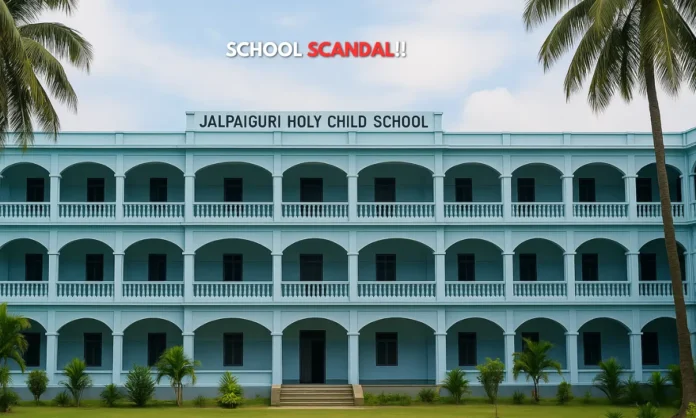Three-Point Summary:
- A Class 8 boy in Jalpaiguri was booked under the POCSO Act for allegedly molesting a female classmate in school.
- The school allegedly tried to suppress the case and threatened the victim’s family, worsening her trauma.
- The Children Welfare Committee (CWC) ordered swift police action, demanding a report within three days.
A Child’s Cry Ignored: Molestation Allegation Shakes Jalpaiguri School
In a case that has stirred public outrage in north Bengal, a Class 8 student at a reputed co-educational private school in Jalpaiguri has been booked under the Protection of Children from Sexual Offences (POCSO) Act. The charges stem from an incident on June 23, when a female classmate was allegedly molested inside the classroom during school hours.
The case took a disturbing turn not just because of the nature of the accusation—but because of the institution’s reported response. When the girl’s parents approached the school on June 25, they claim the authorities threatened them and refused to register the complaint. Instead of immediate redressal or support, the family says they were met with hostility, intimidation, and even threats of legal retaliation against their daughter.
This silence and stonewalling from the school compelled the family to escalate the matter to the Jalpaiguri Children Welfare Committee (CWC). Two weeks later, on July 6, the CWC intervened, directing the Women’s Police Station to take urgent action.
Inside the Complaint: Suppression, Threats, and Trauma
- Incident reportedly took place in a classroom on June 23.
- Parents allege school threatened the survivor with consequences for speaking up.
- CWC ordered police action after school’s alleged inaction and intimidation.
- Victim now facing bullying from peers, says her mother.
The survivor’s mother has painted a grim picture of both the incident and its aftermath. “My daughter was badly traumatised,” she told local media. “And the school wasn’t ready to listen. Instead, they threatened my daughter and warned us not to escalate the matter.” Her statement reveals the isolating and humiliating experience of a child not only subjected to assault but also targeted afterward through institutional neglect and peer harassment.
Equally concerning is the role the school allegedly played in shielding the accused. The principal is reported to have summoned the girl’s mother for a meeting and then threatened her with legal consequences when she didn’t comply. The family, cornered and alarmed, approached the CWC—raising questions about how many such cases might go unreported due to fear and institutional resistance.
A System Steps In: CWC, Police Begin Probe Amid Pressure
- CWC chairman confirmed official instruction to the Women’s Police Station.
- Police inquiry report expected within three days.
- POCSO Act charges filed against the accused student.
- Case now under legal scrutiny, but larger questions about school’s role remain.
CWC chairman Manna Mukherjee confirmed that the committee took cognisance of the complaint and issued directives to the Jalpaiguri Women’s Police Station for urgent intervention. The officer-in-charge has been instructed to submit an inquiry report within three days—a crucial timeline that could determine the pace and fairness of the legal process going forward.
The case, now booked under POCSO, raises critical questions about how educational institutions in India deal with complaints of sexual misconduct—especially those involving children. The law is clear: schools must act immediately, protect the survivor, and report incidents to authorities without delay. But in Jalpaiguri, the exact opposite appears to have happened.
Institutional Rot: When Schools Fail Their Most Vulnerable
- School accused of victim-blaming and threatening legal action against the survivor’s family.
- Peer bullying post-incident adds another layer of psychological damage.
- Highlights growing crisis of unsafe spaces for girls in private institutions.
Beyond legal processes, this case has exposed a deeper rot—how private schools, often seen as safe zones, can sometimes act as barriers to justice. Instead of creating a supportive environment, the survivor and her family faced retaliation, gaslighting, and isolation. What began as an alleged classroom assault has now snowballed into a systemic failure involving faculty, administration, and peers.
The bullying the girl now faces from some classmates suggests the need for urgent psycho-social counselling and anti-bullying protocols within the institution. Yet there’s been no word of any remedial action from the school—not even a suspension of the accused or a public statement on safety measures.
This silence reflects a wider problem: schools focused more on brand protection than child protection. In Jalpaiguri, that silence has cost a young girl her trust, safety, and mental peace.
Between the Chalkboard and the Law: What Comes Next?
The Jalpaiguri molestation case is more than a legal file—it’s a window into the everyday vulnerabilities of school-going girls in India. The response from the CWC has been prompt, and the police inquiry is underway. But structural questions loom: Why did a school ignore mandatory reporting norms under POCSO? Why was a survivor threatened and bullied instead of protected?
For now, the community watches closely. Parents, activists, and educators are demanding accountability not only from the accused student, but from the school management whose silence allegedly enabled further harm. It’s a reminder that justice for children must begin not in courtrooms—but in classrooms.


